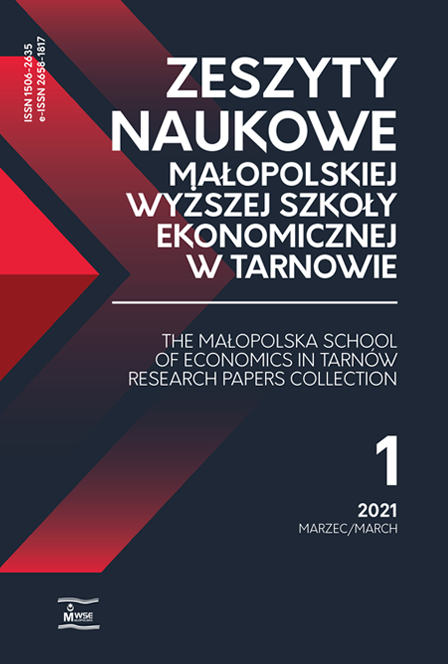Abstract
The Champions League has been the most elite football competition in Europe for several decades. Achieving sports successes makes it much easier for football clubs participating in the Champions League games to have very good financial results, which allow them to spend significant amounts on the purchase of players and their salaries. The total market value of the players in some teams exceeded 1 billion EUR in the 2018/2019 season. In the article the relationship between financial results and sports results in national and international competitions in the seasons 2014/2015–2018/2019 is verified. The efficiency of the football clubs under investigation is verified using a model developed by the author of the article. In addition, dynamics of changes in profits, expenditure on salaries and operating activities as well as the market value of selected European football clubs is presented. The results of the analysis allow to identify football clubs whose activities are characterized by the highest efficiency. Both the market value of the players and the expenses on their salaries have a significant, positive impact on sports performance. However, among the leading European football clubs one can distinguish those that functioned much more effectively than their competitors. Sports successes contribute to increasing the market value of players, but also involve the need to allocate larger amounts to players’ wages.
References
Barajas, A., Fernández-Jardón, C., Crolley, L. (2007). Does sports performance influence revenues and economic results in Spanish football? SSRN Electronic Journal. DOI: 10.2139/ssrn.986365.
View in Google Scholar
Barajas, A., Rodríguez, P. (2010). Spanish football clubs finances: Crisis and player salaries. International Journal of Sport Finance, 5, 52–66.
View in Google Scholar
Baur, D., McKeating, C. (2009). The benefits of financial markets: A case study of European football clubs. SSRN Electronic Journal. DOI: 10.2139/ssrn.1333532.
View in Google Scholar
Beck, N., Meyer, M. (2012). Modeling team performance. Empirical Economics, 43, 335–356. DOI: 10.1007/s00181-011-0463-2.
View in Google Scholar
Carmichael, F., McHale, I., Dennis T. (2011). Maintaining market position: Team performance, revenue and wage expenditure in the English Premier League. Bulletin of Economic Research, 63(4), 464–497. DOI:10.1111/j.1467-8586.2009.00340.x.
View in Google Scholar
Footballbenchmark. (2021). [online, accessed: 2021-04-01]. Retrieved from: www.footballbenchmark.com. Frick, B., Simmons, R. (2007). The impact of managerial quality on organizational performance: Evidence from German soccer. Working Paper Series, 29(7), 593–600. DOI: 10.1002/mde.1431.
View in Google Scholar
García-Sánchez, I. M. (2007). Efficiency and effectiveness of Spanish football teams: A three stage DEA-approach. Central European Journal of Operations Research, 15(1), 21–45. DOI: 10.1007/s10100-006-0017-4.
View in Google Scholar
Guzman, I., Morrow, S. (2007). Measuring efficiency and productivity in professional football teams: Evidence from the English Premier League. Central European Journal of Operations Research, 15, 309–328. DOI:10.1007/s10100-007-0034-y.
View in Google Scholar
Haas, D. J. (2003). Productive efficiency of English football teams—a DEA Approach. Managerial and Decision Economics, 24(5), 403–410. DOI: 10.1002/mde.1105.
View in Google Scholar
Halkos, G., Tzeremes, N. (2011). A non-parametric analysis of the efficiency of the top European football clubs. MPRA Paper, 31173.
View in Google Scholar
Jardin, M. (2009). Efficiency of French football clubs and its dynamics. MPRA Paper, 19828.
View in Google Scholar
Kern, M., Süssmuth, B. (2009). Managerial efficiency in German top league soccer. German Economic Review, 6(4), 485–506. DOI: 10.1111/j.1468-0475.2005.00143.x.
View in Google Scholar
Kulikova, L., Goshunova, A. V. (2013). Measuring efficiency of professional football club in contemporary researches,
View in Google Scholar
World Applied Sciences Journal, 25(2), 247–257. DOI: 10.5829/idosi.wasj.2013.25.02.13307.
View in Google Scholar
McNamara, P., Peck, S., Sasson, A. (2011). Competing business model, value creation and appropriation in English football League. Long Range Planning, 46(6). DOI: 10.1016/j.lrp.2011.10.002.
View in Google Scholar
Pyatunin, A., Vishnyakova, A., Sherstneva, N., Mironova, S., Dneprov, S., Grabozdin, Y. (2016). The economic efficiency of European Football Clubs—Data Envelopment Analysis (DEA) Approach. International Journal of Environmental and Science Education, 11(15), 7515–7534.
View in Google Scholar
Samagaio, A., Couto, E., Caiado, J. (2009). Sporting, financial and stock market performance in English football: An empirical analysis of structural relationships. CEMAPRE Working Papers, 0906.
View in Google Scholar
Sánchez, L., Barajas, A., Sánchez-Fernández, P. (2020). Profits may lead teams to lose matches, but scoring goals does not lead to profit. European Research on Management and Business Economics, 26(1), 1–54. DOI: 10.1016/j.iedeen.2019.12.007.
View in Google Scholar
Solberg, H., Haugen, K. (2009). European club football: Why enormous revenues are not enough? Sport in Society, 13(2), 329–343. DOI: 10.1080/17430430903523036.
View in Google Scholar
Soleimani-Damaneh, J., Hamidi, M., Sajadi, N. (2011). Evaluating the performance of Iranian football teams utilizing linear programming. American Journal of Operations Research, 1, 65–72. DOI: 10.4236/ajor.2011.12010.
View in Google Scholar
Tiscini, R., Dello-Strologo, A. (2016). What drives the value of football clubs: An approach based on private and socio-emotional benefits. Corporate Ownership and Control, 1. DOI: 10.22495/cocv14i1c4art14.
View in Google Scholar
Transfermarkt. (2021). [online, accessed: 2021-04-01]. Retrieved from: https://www.transfermarkt.de/. UEFA. (2021). [online, accessed: 2021-04-01]. Retrieved from: https://www.uefa.com/.
View in Google Scholar

This work is licensed under a Creative Commons Attribution-NonCommercial-NoDerivatives 4.0 International License.

